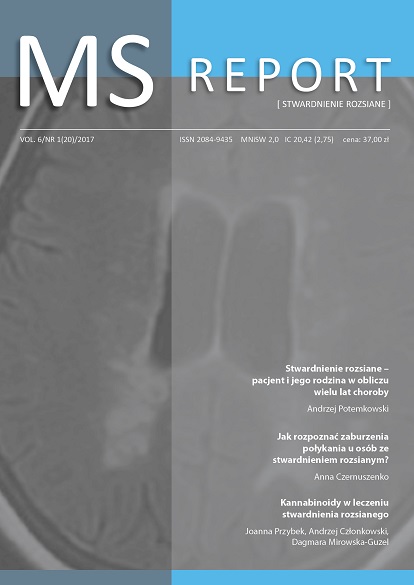Stwardnienie rozsiane – pacjent i jego rodzina w obliczu wielu lat choroby Artykuł przeglądowy
##plugins.themes.bootstrap3.article.main##
Abstrakt
Rodzina pacjenta ze stwardnieniem rozsianym musi się zaadaptować poznawczo i emocjonalnie do tej choroby przewlekłej, czemu towarzyszy przeformułowanie i przewartościowanie wielu celów życiowych. Dylematy chorego związane z okresem wczesnej dorosłości tracą z czasem znaczenie, a priorytetami stają się: zachowanie dotychczasowego statusu rodziny, utrzymanie pracy, dbanie o potomstwo i możliwość sprawowania nad nim opieki. Istotne psychologiczne zadanie to przedefiniowanie siebie i poczucia swojej niezależności. Znaczące jest znalezienie tzw. wolnej strefy.
##plugins.themes.bootstrap3.article.details##
Numer
Dział
Artykuły
Copyright © by Medical Education. All rights reserved.
Bibliografia
1. Kalb R.: When MS joins the family. W: Kalb R. (red.): Multiple Sclerosis: A Guide for Families. Wyd. 3. Demos Medical Publishing, New York 2006: 1-10.
2. Kalb R.: The emotional and psychological impact of multiple sclerosis relapses. J. Neurol. Sci. 2007; 256: S29-S33.
3. Feinstein A.: The clinical neuropsychiatry of multiple sclerosis. Cambridge University Press Publisher, New York 1999.
4. Gonzalez S., Steinglass P., Reiss D.: Putting the illness in its place: discussion groups for families with chronic medical illnesses. Fam. Process. 1989; 281: 69-87.
5. Korostil M., Feinstein A.: Anxiety disorders and their clinical correlates in multiple sclerosis patients. Mult. Scler. 2007; 13: 5-20.
6. Liu X., Ye H.X., Li W.P. et al.: Relationship between psychosocial factors and onset of multiple sclerosis. Eur. Neurol. 2009; 62: 130-136.
7. Minden S.L., Frankel D., Hadden L. et al.: The Sonya Slifka longitudinal multiple sclerosis study: methods and sample characteristics. Mult. Scler. 2006; 12: 24-38.
8. Koopman W.: Needs assessment of persons with multiple sclerosis and significant others: using the literature review and focus groups for preliminary survey questionnaire development. Axone 2003; 24: 10-15.
9. Koopman W., Benbow C., Vandervoort M.: Top ten needs of people with multiple sclerosis and their significant others. J. Neurosci. Nurs. 2006; 38: 369-373.
10. Wollin J., Reiher C., Spencer N. et al.: Caregiver burden: meeting the needs of people who support the person with multiple sclerosis. Int. J. MS Care1999; 2: 27-34.
11. Kalb R.: Coping and adaptation: making a place for MS in your life. W: Kalb R. (red.): Multiple Sclerosis: The Questions You Have; The Answers You Need. Wyd. 4. Demos Medical Publishing, New York 2008: 255-269.
12. Malcolmson K.S., Dunwoody L., Lowe-Strong A.S.: Psychosocial interventions in people with multiple sclerosis. A review. J. Neurol. 2007; 254: 1-13.
13. José Sá M.: Psychological aspects of multiple sclerosis. Clin. Neurol. Neurosurg. 2008; 110: 868-877.
14. Szepietowska M.: Pomoc psychologiczna dla chorych na stwardnienie rozsiane. W: Potemkowski A. (red.): Psychologiczne aspekty stwardnienia rozsianego. Termedia, Poznań 2010.
15. McKeown L.P., Porter-Armstrong A.P., Baxter G.D.: Caregivers of people with multiple sclerosis: experiences of support. Mult. Scler. 2004; 10: 219-230.
16. Mohr D.C.: Stress and multiple sclerosis. J. Neurol. 2007; 254(supl. 2 ): II65-1168.
17. Feinstein A.: Multiple sclerosis, depression and suicide. BMJ 1997; 315: 691-692.
2. Kalb R.: The emotional and psychological impact of multiple sclerosis relapses. J. Neurol. Sci. 2007; 256: S29-S33.
3. Feinstein A.: The clinical neuropsychiatry of multiple sclerosis. Cambridge University Press Publisher, New York 1999.
4. Gonzalez S., Steinglass P., Reiss D.: Putting the illness in its place: discussion groups for families with chronic medical illnesses. Fam. Process. 1989; 281: 69-87.
5. Korostil M., Feinstein A.: Anxiety disorders and their clinical correlates in multiple sclerosis patients. Mult. Scler. 2007; 13: 5-20.
6. Liu X., Ye H.X., Li W.P. et al.: Relationship between psychosocial factors and onset of multiple sclerosis. Eur. Neurol. 2009; 62: 130-136.
7. Minden S.L., Frankel D., Hadden L. et al.: The Sonya Slifka longitudinal multiple sclerosis study: methods and sample characteristics. Mult. Scler. 2006; 12: 24-38.
8. Koopman W.: Needs assessment of persons with multiple sclerosis and significant others: using the literature review and focus groups for preliminary survey questionnaire development. Axone 2003; 24: 10-15.
9. Koopman W., Benbow C., Vandervoort M.: Top ten needs of people with multiple sclerosis and their significant others. J. Neurosci. Nurs. 2006; 38: 369-373.
10. Wollin J., Reiher C., Spencer N. et al.: Caregiver burden: meeting the needs of people who support the person with multiple sclerosis. Int. J. MS Care1999; 2: 27-34.
11. Kalb R.: Coping and adaptation: making a place for MS in your life. W: Kalb R. (red.): Multiple Sclerosis: The Questions You Have; The Answers You Need. Wyd. 4. Demos Medical Publishing, New York 2008: 255-269.
12. Malcolmson K.S., Dunwoody L., Lowe-Strong A.S.: Psychosocial interventions in people with multiple sclerosis. A review. J. Neurol. 2007; 254: 1-13.
13. José Sá M.: Psychological aspects of multiple sclerosis. Clin. Neurol. Neurosurg. 2008; 110: 868-877.
14. Szepietowska M.: Pomoc psychologiczna dla chorych na stwardnienie rozsiane. W: Potemkowski A. (red.): Psychologiczne aspekty stwardnienia rozsianego. Termedia, Poznań 2010.
15. McKeown L.P., Porter-Armstrong A.P., Baxter G.D.: Caregivers of people with multiple sclerosis: experiences of support. Mult. Scler. 2004; 10: 219-230.
16. Mohr D.C.: Stress and multiple sclerosis. J. Neurol. 2007; 254(supl. 2 ): II65-1168.
17. Feinstein A.: Multiple sclerosis, depression and suicide. BMJ 1997; 315: 691-692.

